



India is now the world's most populous country, but how does such a massive country ensure that governance and the government reach everyone? Public service delivery encompasses healthcare, education, infrastructure, sanitation, and social welfare programmes. Decentralisation and digitisation (D&D) are two of the critical levers needed for improving public service delivery. Andhra Pradesh has an example.
CEEW’s field visit to Visakhapatnam in Andhra Pradesh to document the city’s waste management practices helped us see how a unique model of governance works — the Sachivalayam system. We met Dr Tirumala Thulasi, who serves both as the sanitary inspector and a Sachivalayam secretary and is responsible for overseeing the sanitation and environment department for Ward 53 of Visakhapatnam.
Dr Tirumala Thulasi’s day starts at 6 am, when she takes the biometric attendance of all safai karamcharis (sanitation workers) in her ward using a government mobile app. She then monitors the door-to-door collection of solid waste on the app, which is integrated with the Radio Frequency Identification (RFID) installed at the gates of households. Assisted by volunteers, Thulasi conducts on-site inspections of waste collection and monitors road sweeping and drainages. Additionally, she conducts community awareness activities such as segregation of waste at source and home composting. She also carries a handheld radio device for better communication and coordination with other sanitary inspectors and officials from the municipality.
Professor Tirumala showed us the Jyothinagar Sachivalayam, which operates out of a small building. The secretariat caters to over 3,700 people residing in 1,278 households. Residents, whom we interacted with, come to the Sachivalayam for various purposes such as information about welfare schemes, collecting certificates and raising complaints.
Launched in 2019, the Gram/ward Sachivalayam (Secretariat) system ensures that public service is available and accessible. There is one gram secretariat for every 2,000 and one ward secretariat for every 4,000 citizens, providing 540 services related to 35 governmental departments.It ensures accountability and transparency in public services by bringing decision-making closer to people.
How the Sachivalayam system is integrating jobs, growth and sustainability
The Government of Andhra Pradesh established these Sachivalyams to provide grassroots-level services under various functionaries such as welfare and education, sanitation and environment, planning and regulation. To facilitate this, 3,842 ward secretariats and 11,162 village secretariats were established, creating over 4 lakh employment opportunities across the state. The government also introduced the concept of 'Navaratnalu' – nine welfare schemes for the people of Andhra Pradesh – to align with the Sustainable Development Goals (SDGs) and eventually improve peoples’ living standards.
This secretariat system is digitised to improve governance and speed up services to citizens, such as payment of property taxes, registering for welfare schemes, filing grievances, as well as mapping and monitoring of services. All this is accomplished through user-centric digital platforms such as Spandana, MeeSeva, OWMS (Online Waste Management System), Clean Andhra Pradesh and E-works in the state. Also, the state monitors the status of various public services through a universal dashboard.
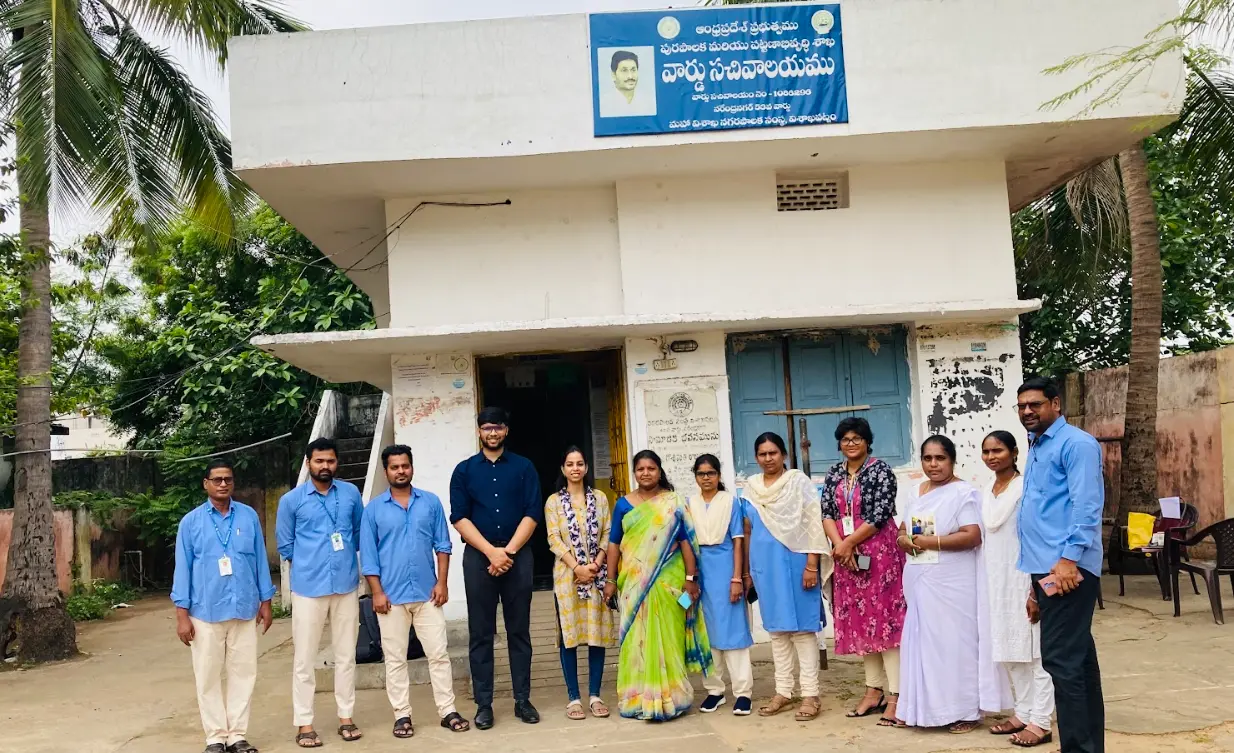
CEEW team meets the Secretaries of the Jyothinagar Sachivalayam in Visakhapatnam | CEEW
Impact of the Sachivalayam system
The system has helped Visakhapatnam improve its sanitation and waste management systems. The city jumped from a rank of 23 in 2019 to 4 in 2022 in the Swachh Survekshan Rankings. Additionally, data from the Spanada portal for Andhra Pradesh shows that about 7.6 lakh grievances were reported until May 2023 and more than 95 per cent of them were resolved. To achieve this scale of public service, people such as Tirumala and many other secretaries and volunteers have played an important role.
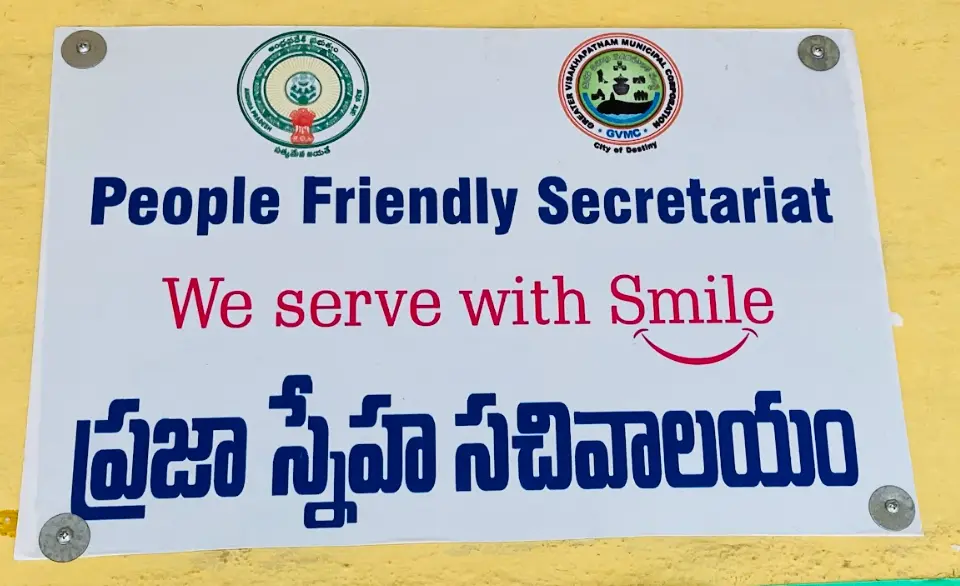
Scaling such a public service system
Andhra Pradesh has fostered transparency by making multiple datasets and dashboards accessible to the public. This benefits not only citizens but also researchers and policymakers by enabling a feedback mechanism to improve the system. We also observed some scope for improvement, and by addressing them, the system can further be strengthened.
First, we noticed some of the data on the dashboards are not reported or updated effectively. For instance, the Andhra Pradesh Smart City Online Waste Management System portal shows a ‘gate scan’ that indicates the number of households from where waste is collected. However, the ratio between gate scan and total number of gates is low. During our field visit, we found one of the possible reasons to be the non-repairment/replacement of old or faulty RFID scanners.
Second, although the state has been able to address a mammoth number of grievances lodged using apps, toll free number and online portals but their customer satisfaction rating has been low. This could be due to redressal of complaints outside the timeframe of service level agreement (SLA).
As other Indian states such as Tamil Nadu have shown interest in adopting the secretariat system, there is an opportunity to tailor and enhance its functionalities based on a given state’s conditions and priorities.
Adeel Khan is a research analyst and Srishti Mishra is a research analyst at the Council on Energy, Environment and Water (CEEW). Send your comments to [email protected].



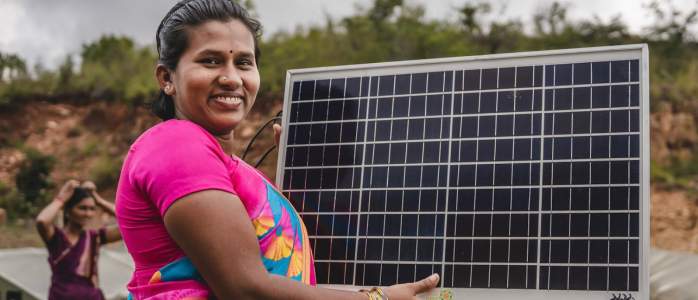
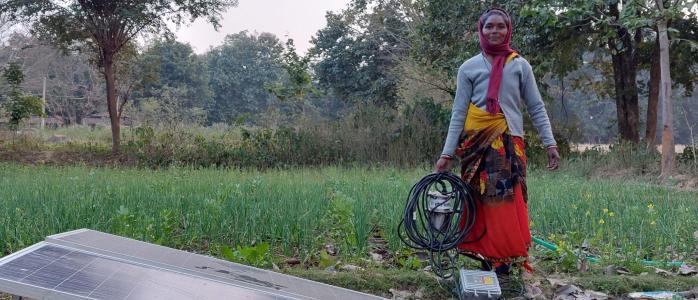
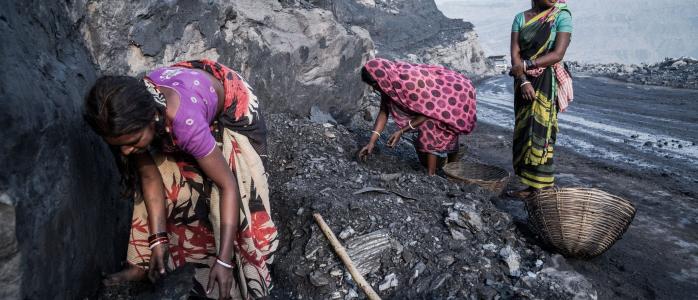
Add new comment